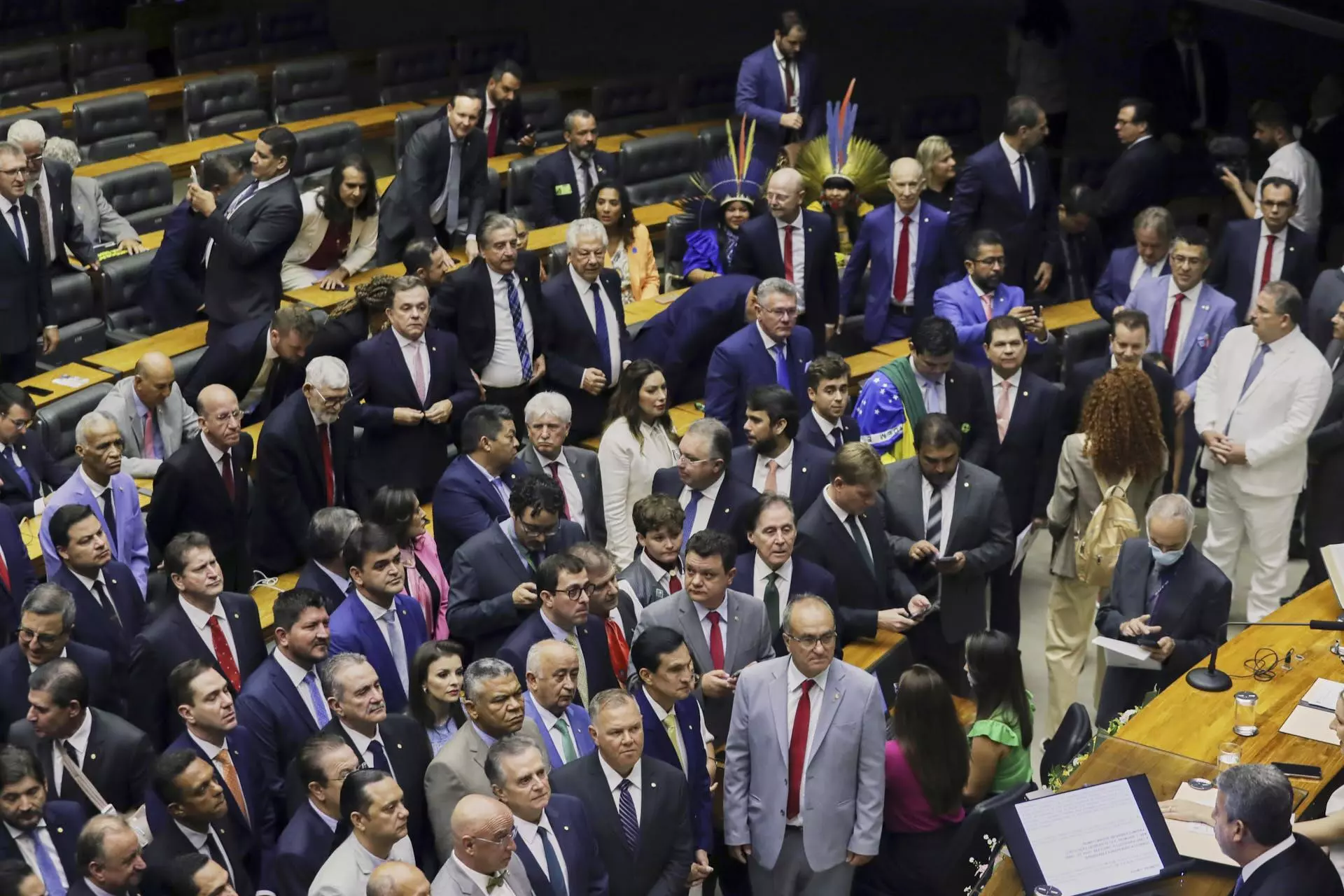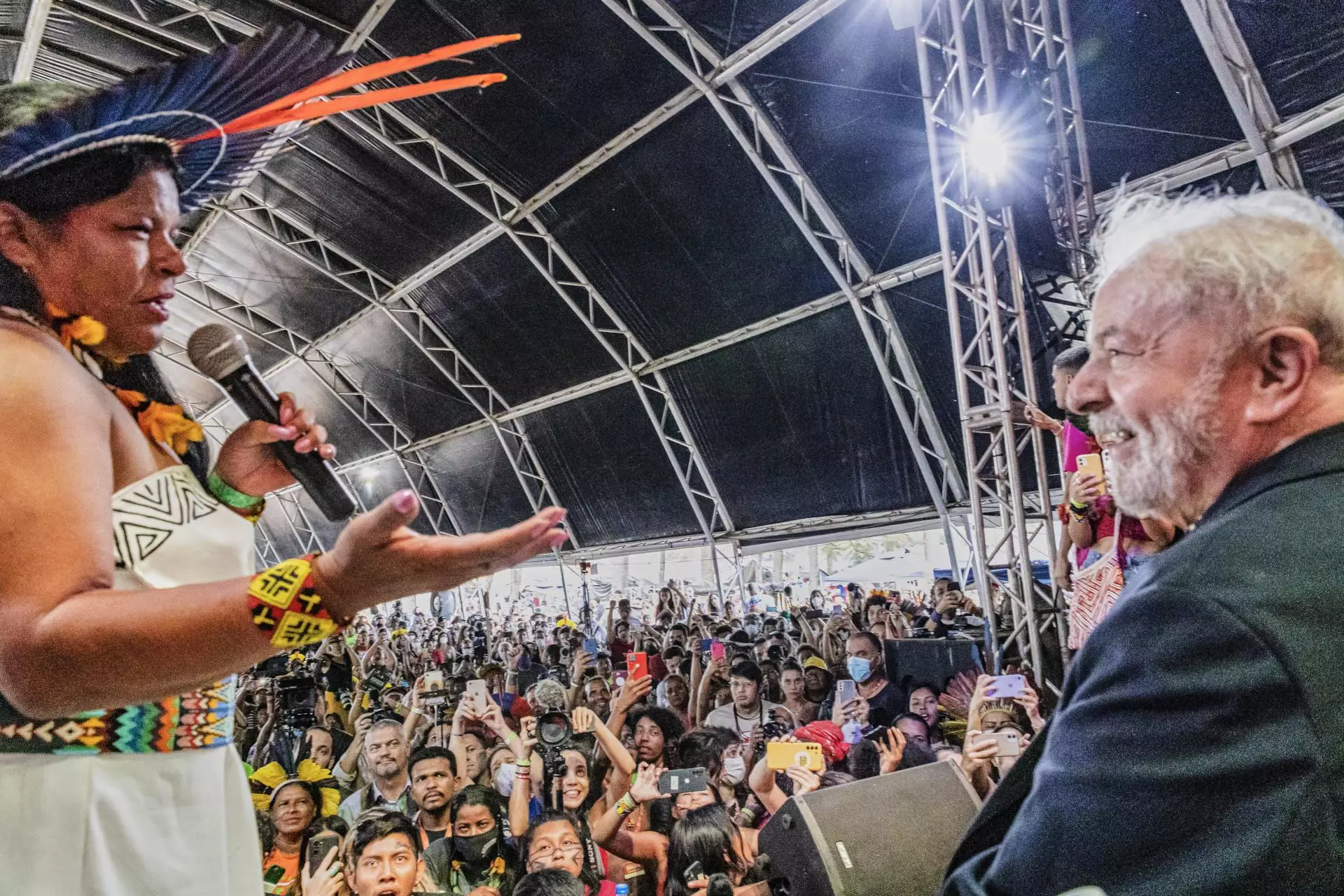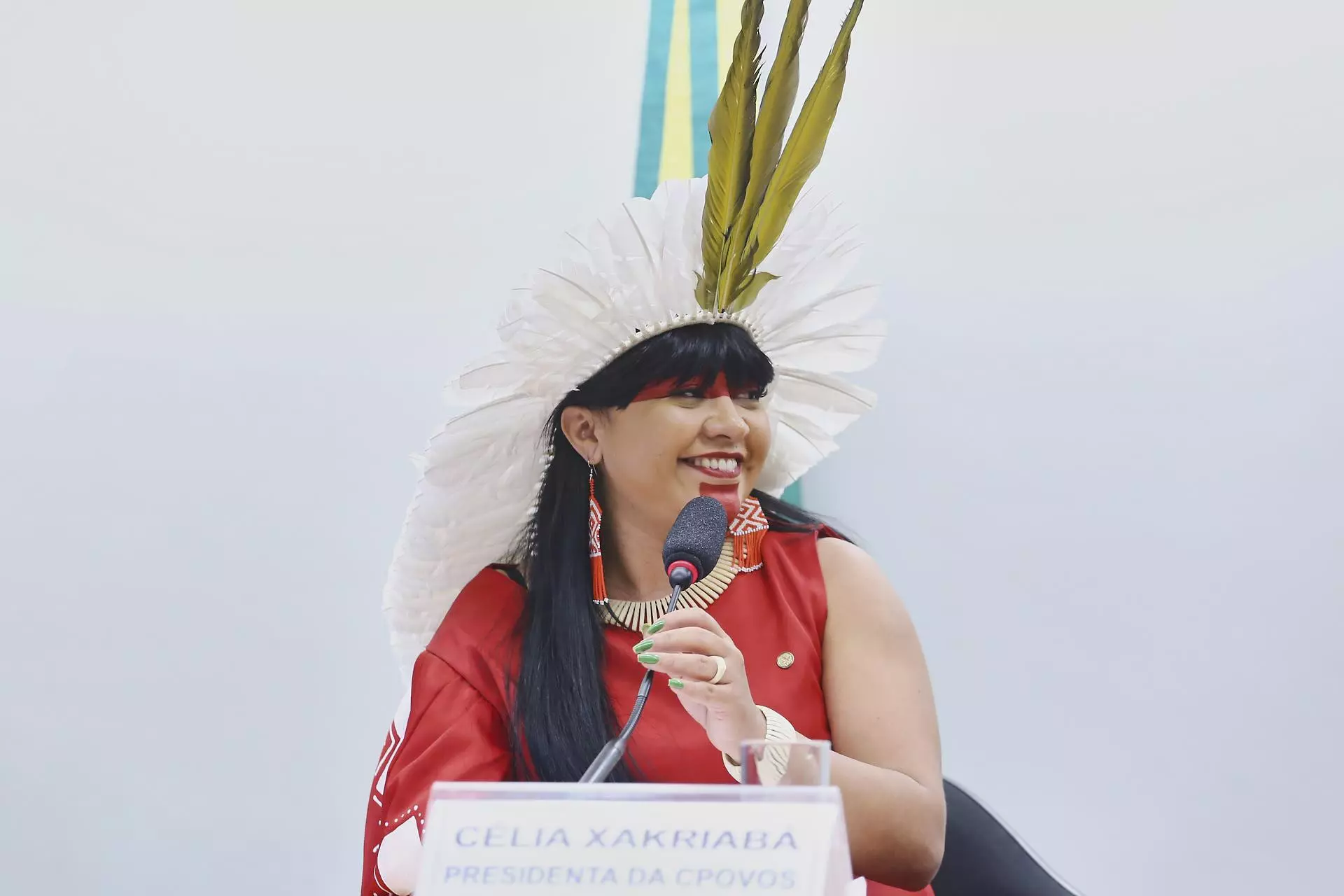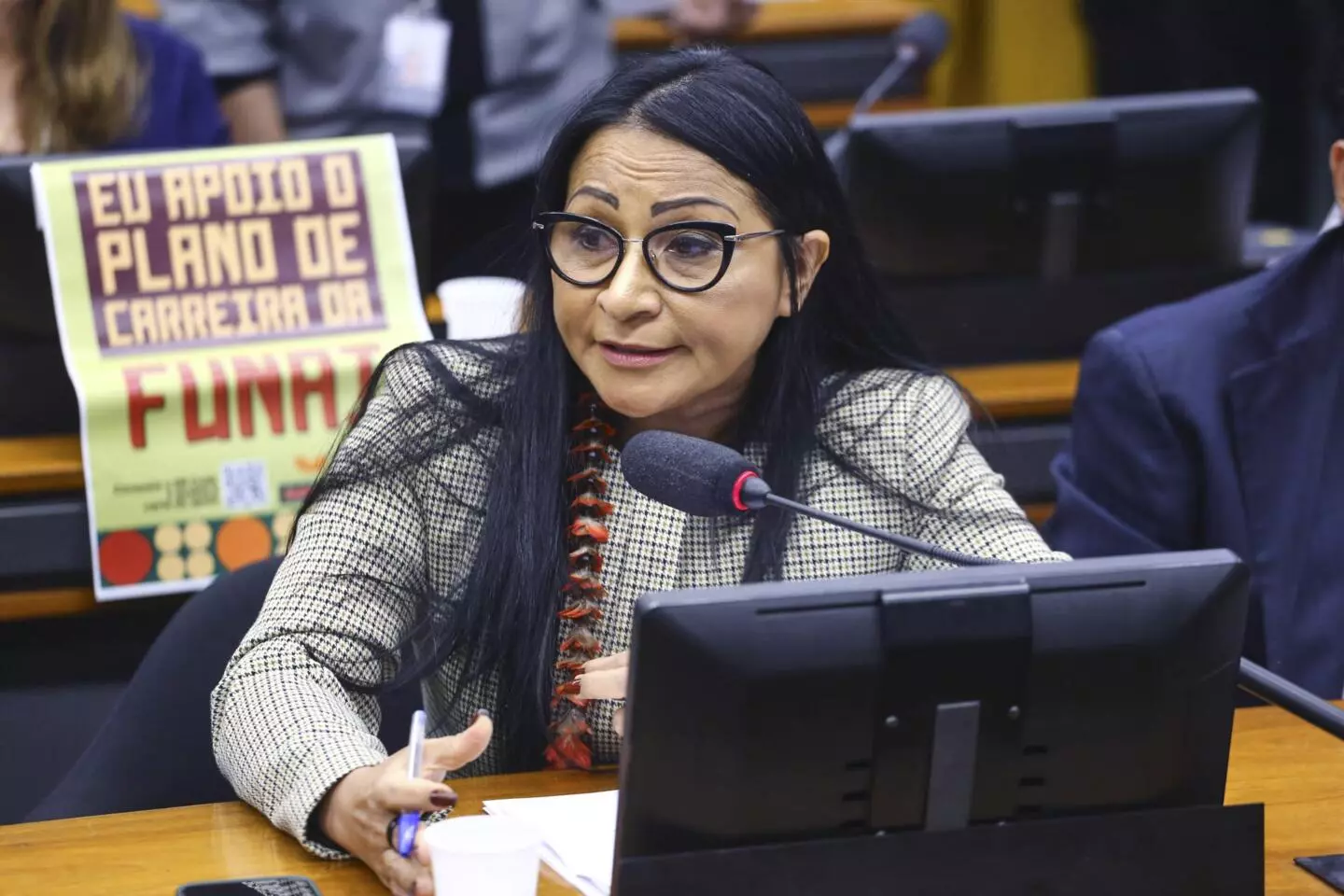The song, accompanied by the rattling rhythm of maracas, filled Plenary Session 12, in an annex of Brazil’s Chamber of Congress, just as Sonia Guajajara, the country’s Minister of Indigenous Peoples, was wrapping up her opening speech. “It’s a way of saying (to the minister): we’re here and we’re with you,” explained Junior Xukuru – an Indigenous member of the Xukuru people who traveled to Brasília to attend the hearing – later told SUMAÚMA. Junior and Leonel Atikum, of the Atikum people in the state of Pernambuco, and an academic at the University of Brasília, were behind the ceremony.
A lone female voice, however, expressed indignation, repeating the words “Order, order, (singing) is not part of the regulations,” throughout the two-minute celebration. The indignant party was not, as might be expected, a non-Indigenous person, but Silvia Waiãpi, an Indigenous woman and member of congress for the Liberal Party, as well as an ex-army lieutenant and supporter of Brazil’s far-right former president Jair Bolsonaro, in whose government she worked. Waiãpi is also the subject of an investigation by Brazil’s Federal Supreme Court for alleged incitement of the attempted coup in January.
It was Sonia Guajajara’s first congressional audience since taking over as Minister of Indigenous Peoples. The invitation, to talk about the challenges of her work in the first 100 days of Brazil’s new government, had been extended by the Indigenous federal deputy Célia Xakriabá, of the Socialism and Liberty Party, who is at the forefront of the “Headdress Lobby” in Congress, and the president of the Committee for the Amazon and Original and Traditional Peoples. The “jaguars” were the Indigenous members of this group, elected to confront “the lions” of Congress, in this “deforested green hall” – terms used by Célia Xakriabá herself in an interview with SUMAÚMA. Another Indigenous member of congress, Juliana Cardoso of the Workers’ Party, adds her voice to the cause in Congress.

Sonia Guajajara and Célia Xakriabá (above), members of Congress and representatives of the “Headdress Lobby”, participate in the inaugural session of a Congress dominated by white men, on February 1, 2023. Photo: Pablo Valadares / Brazilian Congress
The election of these representatives of Brazil’s native peoples is the result of a collective effort that brought together more than 180 Indigenous candidates under the slogan “Called by the Land.” Affiliated to the Socialism and Liberty Party in the state of São Paulo, Sonia Guajajara was named as the head of the newly created Ministry of Indigenous Peoples by Brazil’s president Luiz Inácio Lula da Silva, commonly known as Lula, before she even had the chance to take her seat in Congress.
When she regained the microphone after the chant begun by Júnior Xukuru and Leonel Atikum, she acknowledged the importance of the demonstration. “I’d like to reaffirm that the indigenization of politics is not just about physical presence (of Indigenous peoples in political spaces). We need to bring our culture, and our rituals, so that people really find out who the Indigenous peoples of Brazil are. It’s our songs, our maracas, our voice, and our ancestry. We need Brazil to recognize this diversity of peoples and cultures, and we have to start with the home of the people, which is here, which is parliament,” she said, applauded by the majority of those present.
A year ago, in April 2022, at the Acampamento Terra Livre (the Free Land Camp, a gathering of Brazil’s Indigenous peoples in Brasilia), Lula, then a presidential candidate, announced that, if elected, he would create a Ministry of Indigenous Peoples. At the event, he listened to Sonia Guajajara explain what the Indigenous leaders were thinking. “We’re here to show Brazil and the world that we’re taking back (…) taking back Brazil, demarcating territories and indigenizing politics. Because for only one of 513 members of Congress to be an Indigenous woman (at the time, Joenia Wapichana, the current president of Brazil’s federal agency for Indigenous affairs, known as Funai) is no longer good enough. We want someone to take back our participation in the spaces of social control, where Brazil’s government policies are constructed. We want the Indigenous health secretariat strengthened. We can no longer bear to see children sucked into the dredgers of illegal mining.” Indigenizing politics is to take the Indigenous peoples’ way of seeing and thinking the world into positions of power, something that Sonia Guajajara has achieved.

Sonia Guajajara, at the Free Land Camp 2022 in Brasília, announced that Brazil needed to “indigenize politics.” At the event, Lula, then a presidential candidate, promised to create a Ministry of Indigenous Peoples. Photo: Mídia Ninja
Now a minister, she returned to the theme in one of the first political meetings in which she set out her territory for parliamentarians. “This historic achievement is the result of the struggle, resistance and union of the Indigenous movement which, in recent years, has been organizing itself and devising strategies to overcome under-representation in the spaces of power,” she said in her opening speech at the congressional committee. “The Indigenous peoples decided to create a policy so they could bring their way of thinking and acting to the decision-making bodies.”
Amid the warm embrace of the singing of Indigenous peoples from various ethnic groups at the meeting – and by most of the non-Indigenous people who helped fill the 80-seater room – the concept of “indigenizing politics” also had its opponents that afternoon, in a clash between the urgency of Indigenous demands and the din with which the extreme right seeks to surround the public debate. The press coverage that day made it clear that belligerence can gain more space than the Indigenous cause, with the transphobic discourse of Silvia Waiãpi, no stranger to the strategies of Bolsonaro’s factoid creation playbook, making headlines in various major media outlets. “You want me to accept someone who declares themselves a woman, without being a woman, (being) biologically a man. I’m obliged to accept him, but they don’t want to accept me,” she said, addressing Dorinaldo Malafaia, of the Democratic Labor Party, who had pointed out that the Waiãpi people do not recognize Silvia as their representative. That which had brought Guajajara to the hearing – her report on the immense challenge of building, from the ground up, a ministry that only came into existence 100 days ago – and the attempts to silence the traditional manifestations of Indigenous peoples, using the “regulations” as a weapon, were almost ignored.
‘Why do you insist on considering Indigenous lands to be unproductive?’
Ten processes for the demarcation of new Indigenous lands have already been finalized and are in the hands of Rui Costa, the chief minister of the Casa Civil (the Executive Office Of The President Of Brazil) Sonia Guajajara told the Committee. There they will undergo political and legal analysis before arriving on Lula’s desk for the president to make his decision. Guajajara, however, hopes at least some of the new demarcations will be announced at the next Free Land Camp, at the end of April – “The Indigenous future is today. Without demarcation there is no democracy!” is the event’s slogan. The identity of these territories, however, remains a closely guarded secret at the Ministry of Indigenous Peoples, a member of the department told SUMAÚMA, in order to prevent the ruralist lobby, the most cohesive and influential in Congress, from uniting against the demarcations.
Yet such opposition is already underway. The Progressives, the party of Arthur Lira, the powerful president of Brazil’s Lower House and himself a ruralist, have requested that the Federal Supreme Court remove the ability to demarcate new Indigenous lands from the Public Prosecutor’s Office. Until 2022, this power had been in the hands of the Ministry of Justice, until it was switched – together with Funai itself – to the Prosecutor’s Office, created through a provisional act signed by Lula, which Congress is still to approve. Presiding over the action brought by the Progressives will be the Bolsonaro-appointed Supreme Court justice Nunes Marques, who has already voted against Indigenous peoples in another significant case, that of the “time frame” (the argument that Indigenous peoples should only be entitled to claim ownership of land they were occupying in 1988, when Brazil’s constitution came into force), in September 2021, before the motion was shelved.
“The demarcation of Indigenous lands is the primary demand of the Indigenous movement and, consequently, the most urgent demand for our ministry,” Sonia explained to the congressional committee. “Where there is an Indigenous presence, regardless of whether the territory is demarcated or not, there is a guarantee of clean water, poison-free food, and protected biodiversity. We Indigenous people are only 5% of the world’s population, yet we protect 80% of the world’s biodiversity.”
However, she made the scale of the challenge very clear – especially given her ministry’s tiny budget. “This year we only have 50 million reais (around nine million, nine hundred thousand US dollars) to guarantee a functioning structure. The budget we have (to continue) working today is, together with Funai, 640 million reais (around 126 million US dollars) for the entire country. And when you take out Funai’s operating expenses, there is only an average of 200 million reais (around 39 million US dollars) left to ensure we remain active,” said Sonia. For the rest, for now there are only possibilities. “(The Public Prosecutor’s Office) is interfacing with over 30 ministries, initially, so we can guarantee the inclusion of actions for Indigenous peoples this year,” she said.
To have an idea of how small the budget of the Ministry of Indigenous Peoples is, Brazil’s National Mining Agency has a forecast budget of more than 1 billion reais (around 198 million US dollars) in 2023 – five times more than the 200 million that Sonia referred to; the Ministry of Cities has 20 billion reais (around four billion US dollars) at its disposal (100 times more); and the Ministry of Defense, 122 billion reais (around 24 billion US dollars), 610 times more.
When facing a debate of fundamental importance for the future of Brazil, the opposition chose to create memes. Silvia Waiãpi tried to link the culture of the Guajajara people to marijuana trafficking. Another Bolsonaro loyalist, Paulo Fernando Melo da Costa of the Brazil Republicans party, who presents himself as a “lawyer, journalist and teacher”, suggested that Indigenous people – without distinction – “kill children born with disabilities.” For years, the Brazilian far right has used an aspect of the culture of a small number of Indigenous peoples to “make believe that infanticide is common among Indigenous people”, according to a lawsuit filed by the Federal Public Prosecutor’s Office for the state of Roraima against ultraconservative organizations linked to the former government minister Damares Alves. In 2018, such groups released a fraudulent film on the subject, later ordered off the air by the courts. Like Paulo Fernando, Damares is affiliated with the Brazil Republicans Party in the country’s Federal District. By reducing a complex and delicate debate to such simplicity, the far right seeks to criminalize the entire traditional culture of Indigenous peoples as a strategy to advance into their lands.
Marcos Antonio Pereira Gomes, who goes by the name of Zé Trovão, a congressman for Brazil’s Liberal Party, has set out a tortuous theory in which the Japanese affinity for technology is used to justify the approval of a bill that “gives Indigenous peoples the right to work their lands if they want.” “They argue that technology will remove Indigenous culture. If that were the case, the Japanese would have lost their culture. Because they are technological and keep their culture alive,” he argued. Zé Trovão, who was arrested in 2021 after making threats to Brazilian democracy, is in favor of liberating mining and the monoculture of commodities such as soy on Indigenous lands, arguing that “problems can be solved with money.”
“Why do you insist on considering Indigenous lands to be unproductive, if it is precisely these territories which ensure a standing forest and the air everyone has to breathe? It is these areas that mean Brazil is not yet a great green desert. I am not against food production in any way. What is needed now is an urgent change in food production and food systems. Because, if you continue on this path of insisting on monocultures, the planet won’t withstand another 50 years,” countered Sonia Guajajara. “I wish everything could be bought with money – where is congressman Zé Trovão?” she asked, looking for him on the stage.
But the Bolsonarist had already left the room. He was a few meters away, posing for selfies in the long hall of Congress where plenary sessions are held and committees meet. In another overcrowded room, Brazil’s Minister of Justice, Flávio Dino, was trying to make himself heard to the Security and Justice Committee, but the meeting was shut down after tempers flared among parliamentarians. Present at the melee was Zé Trovão. The topic being debated was one that stirs the passions of the far right: the possession and carrying of arms.
‘The beginning of a historical reparation’
Towards the end of the meeting, Sonia Guajajara was – despite everything – satisfied. ” I enjoyed coming here [to Congress]. I’m really enjoying my work in the Ministry. The challenges are great, but there are also many opportunities: to join together, dialogue, learn, and raise awareness,” she said. “We have this strategy of indigenizing politics, which for us is being able to reach all spaces. We are living through a moment that marks the beginning of a historical reparation, a new moment in the history of Brazil, in the history of Brazilian politics, with the presence of Indigenous peoples. I’m very sorry to hear that many people hope things go wrong.”

Célia Xakriabá (Socialism and Liberty party), in the frontline of the “Headdress Lobby” in Brazil’s Congress, and chair of the Committee for the Amazon and Original and Traditional Peoples. Photo: Vinicius Loures/Brazilian Congress
Célia Xakriabá, a member of Congress and one of Sonia Guajajara’s closest allies, reinforces the point. “We have never seen an [Indigenous] minister or a committee chaired by an Indigenous [woman],” she says. “The original peoples, the traditional communities of the Amazon, the waters and the land, is not exactly a progressive issue. Regardless of ideology, regardless of party, we are here to think about what is best for the planet. To begin a discussion of Indigenous policy, but from the perspective of Indigenous peoples. We also think it’s important to discuss economics from a bioeconomy perspective, related to Indigenous ways of life.”
They know this will not be easy, because they were born fighting. The strategy of the far right, present in parliament in far greater numbers, has already shown at this first audience that it intends to follow its usual strategy: to prevent debate and divert press attention towards the creation of factoids. What science has already revealed about the climate emergency, however, shows the next generations will only stand a chance if progressive forces create conditions in which the work of people like Sonia Guajajara and Célia Xakriabá can bear fruit in the degraded land of the Brazilian Congress.
Spell check (Portuguese): Elvira Gago
Translation into Spanish: Meritxell Almarza
English translation: James Young
Photography editing: Marcelo Aguilar, Mariana Greif and Pablo Albarenga






